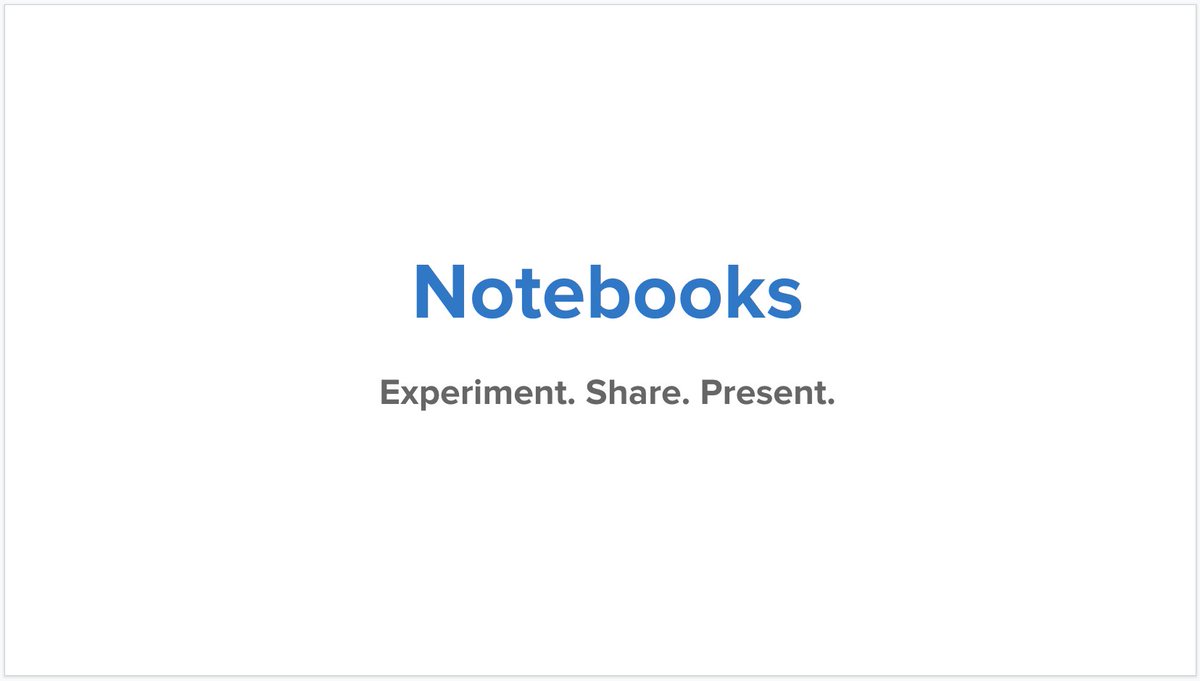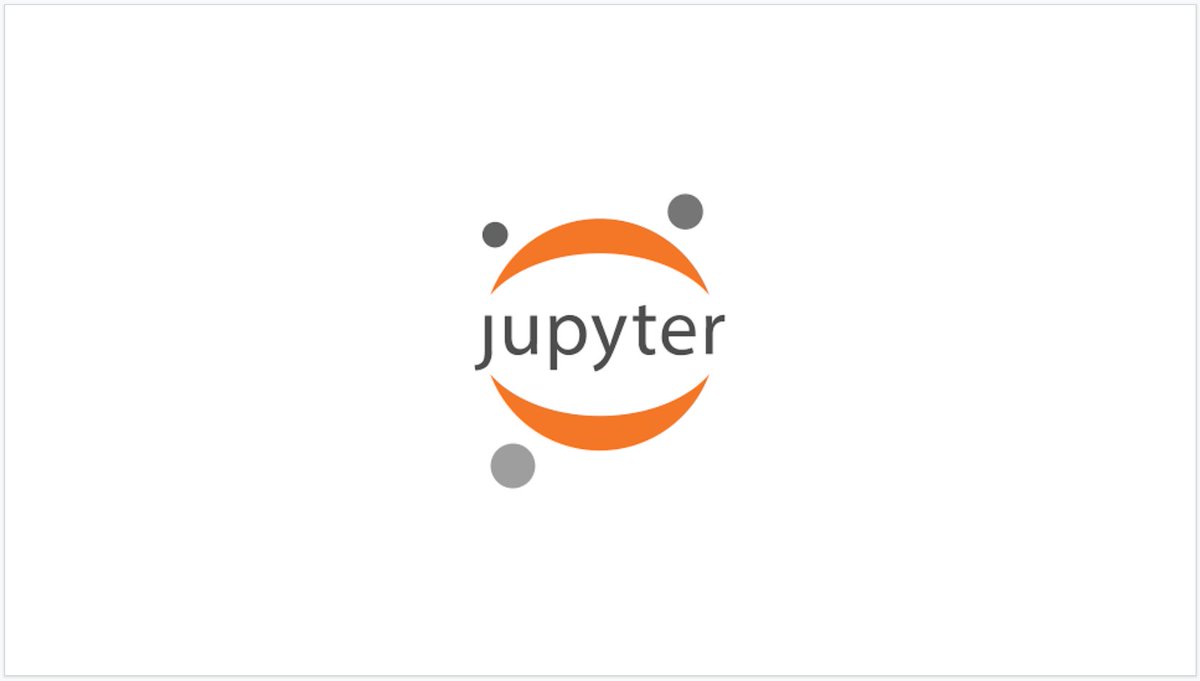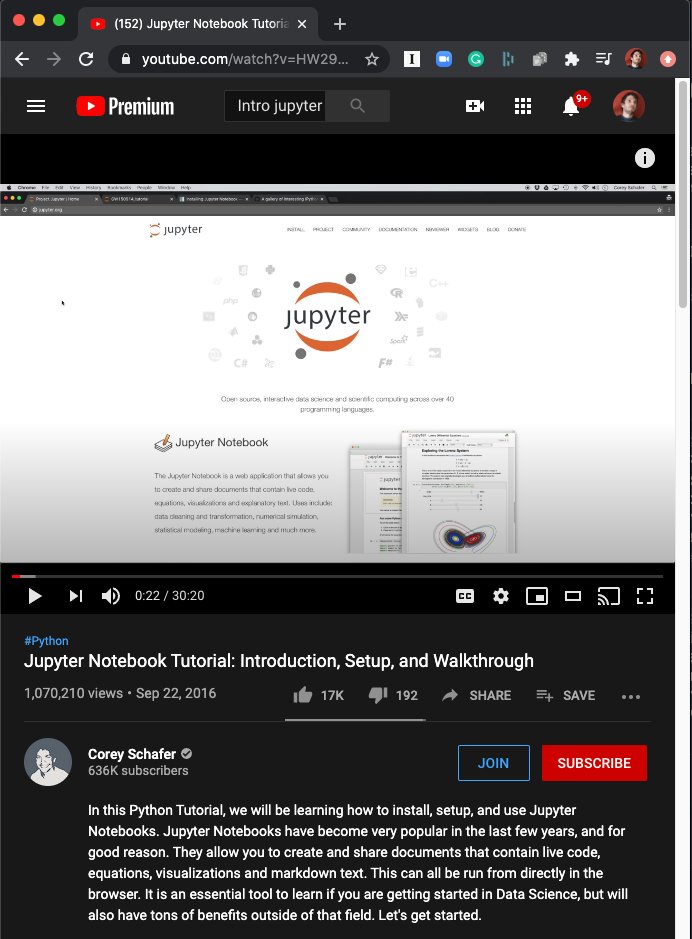It was a great improvement when I learned to use notebooks!
 https://abs.twimg.com/emoji/v2/... draggable="false" alt="▫️" title="Weißes kleines Quadrat" aria-label="Emoji: Weißes kleines Quadrat">To run experiments
https://abs.twimg.com/emoji/v2/... draggable="false" alt="▫️" title="Weißes kleines Quadrat" aria-label="Emoji: Weißes kleines Quadrat">To run experiments
 https://abs.twimg.com/emoji/v2/... draggable="false" alt="▫️" title="Weißes kleines Quadrat" aria-label="Emoji: Weißes kleines Quadrat">To share my code
https://abs.twimg.com/emoji/v2/... draggable="false" alt="▫️" title="Weißes kleines Quadrat" aria-label="Emoji: Weißes kleines Quadrat">To share my code
 https://abs.twimg.com/emoji/v2/... draggable="false" alt="▫️" title="Weißes kleines Quadrat" aria-label="Emoji: Weißes kleines Quadrat">To present my work
https://abs.twimg.com/emoji/v2/... draggable="false" alt="▫️" title="Weißes kleines Quadrat" aria-label="Emoji: Weißes kleines Quadrat">To present my work
It& #39;s a very different dynamic!
If you are a Python https://abs.twimg.com/emoji/v2/... draggable="false" alt="🐍" title="Schlange" aria-label="Emoji: Schlange"> developer, notebooks will be a multiplier for your career.
https://abs.twimg.com/emoji/v2/... draggable="false" alt="🐍" title="Schlange" aria-label="Emoji: Schlange"> developer, notebooks will be a multiplier for your career.
Let& #39;s talk about them:
 https://abs.twimg.com/emoji/v2/... draggable="false" alt="🧵" title="Thread" aria-label="Emoji: Thread">
https://abs.twimg.com/emoji/v2/... draggable="false" alt="🧵" title="Thread" aria-label="Emoji: Thread"> https://abs.twimg.com/emoji/v2/... draggable="false" alt="👇" title="Rückhand Zeigefinger nach unten" aria-label="Emoji: Rückhand Zeigefinger nach unten">
https://abs.twimg.com/emoji/v2/... draggable="false" alt="👇" title="Rückhand Zeigefinger nach unten" aria-label="Emoji: Rückhand Zeigefinger nach unten">
It& #39;s a very different dynamic!
If you are a Python
Let& #39;s talk about them:
A notebook is an "interactive computing environment."  https://abs.twimg.com/emoji/v2/... draggable="false" alt="🤓" title="Nerd-Gesicht" aria-label="Emoji: Nerd-Gesicht">
https://abs.twimg.com/emoji/v2/... draggable="false" alt="🤓" title="Nerd-Gesicht" aria-label="Emoji: Nerd-Gesicht">
This means that you can:
 https://abs.twimg.com/emoji/v2/... draggable="false" alt="▫️" title="Weißes kleines Quadrat" aria-label="Emoji: Weißes kleines Quadrat">Write code
https://abs.twimg.com/emoji/v2/... draggable="false" alt="▫️" title="Weißes kleines Quadrat" aria-label="Emoji: Weißes kleines Quadrat">Write code
 https://abs.twimg.com/emoji/v2/... draggable="false" alt="▫️" title="Weißes kleines Quadrat" aria-label="Emoji: Weißes kleines Quadrat">Use widgets
https://abs.twimg.com/emoji/v2/... draggable="false" alt="▫️" title="Weißes kleines Quadrat" aria-label="Emoji: Weißes kleines Quadrat">Use widgets
 https://abs.twimg.com/emoji/v2/... draggable="false" alt="▫️" title="Weißes kleines Quadrat" aria-label="Emoji: Weißes kleines Quadrat">Plot charts
https://abs.twimg.com/emoji/v2/... draggable="false" alt="▫️" title="Weißes kleines Quadrat" aria-label="Emoji: Weißes kleines Quadrat">Plot charts
 https://abs.twimg.com/emoji/v2/... draggable="false" alt="▫️" title="Weißes kleines Quadrat" aria-label="Emoji: Weißes kleines Quadrat">Write text (Markdown!)
https://abs.twimg.com/emoji/v2/... draggable="false" alt="▫️" title="Weißes kleines Quadrat" aria-label="Emoji: Weißes kleines Quadrat">Write text (Markdown!)
 https://abs.twimg.com/emoji/v2/... draggable="false" alt="▫️" title="Weißes kleines Quadrat" aria-label="Emoji: Weißes kleines Quadrat">Write equations
https://abs.twimg.com/emoji/v2/... draggable="false" alt="▫️" title="Weißes kleines Quadrat" aria-label="Emoji: Weißes kleines Quadrat">Write equations
 https://abs.twimg.com/emoji/v2/... draggable="false" alt="▫️" title="Weißes kleines Quadrat" aria-label="Emoji: Weißes kleines Quadrat">Display images
https://abs.twimg.com/emoji/v2/... draggable="false" alt="▫️" title="Weißes kleines Quadrat" aria-label="Emoji: Weißes kleines Quadrat">Display images
 https://abs.twimg.com/emoji/v2/... draggable="false" alt="▫️" title="Weißes kleines Quadrat" aria-label="Emoji: Weißes kleines Quadrat">Display videos
https://abs.twimg.com/emoji/v2/... draggable="false" alt="▫️" title="Weißes kleines Quadrat" aria-label="Emoji: Weißes kleines Quadrat">Display videos
All of this in the same place! Like an interactive book!
 https://abs.twimg.com/emoji/v2/... draggable="false" alt="👇" title="Rückhand Zeigefinger nach unten" aria-label="Emoji: Rückhand Zeigefinger nach unten">
https://abs.twimg.com/emoji/v2/... draggable="false" alt="👇" title="Rückhand Zeigefinger nach unten" aria-label="Emoji: Rückhand Zeigefinger nach unten">
This means that you can:
All of this in the same place! Like an interactive book!
Notebooks contain "cells":
 https://abs.twimg.com/emoji/v2/... draggable="false" alt="▫️" title="Weißes kleines Quadrat" aria-label="Emoji: Weißes kleines Quadrat">You can write code on each cell (or anything, really)
https://abs.twimg.com/emoji/v2/... draggable="false" alt="▫️" title="Weißes kleines Quadrat" aria-label="Emoji: Weißes kleines Quadrat">You can write code on each cell (or anything, really)
 https://abs.twimg.com/emoji/v2/... draggable="false" alt="▫️" title="Weißes kleines Quadrat" aria-label="Emoji: Weißes kleines Quadrat">You can execute each cell independently
https://abs.twimg.com/emoji/v2/... draggable="false" alt="▫️" title="Weißes kleines Quadrat" aria-label="Emoji: Weißes kleines Quadrat">You can execute each cell independently
 https://abs.twimg.com/emoji/v2/... draggable="false" alt="▫️" title="Weißes kleines Quadrat" aria-label="Emoji: Weißes kleines Quadrat">Memory is shared across cells
https://abs.twimg.com/emoji/v2/... draggable="false" alt="▫️" title="Weißes kleines Quadrat" aria-label="Emoji: Weißes kleines Quadrat">Memory is shared across cells
These last two points are huge and one of the main draws of notebooks for new developers!
 https://abs.twimg.com/emoji/v2/... draggable="false" alt="👇" title="Rückhand Zeigefinger nach unten" aria-label="Emoji: Rückhand Zeigefinger nach unten">
https://abs.twimg.com/emoji/v2/... draggable="false" alt="👇" title="Rückhand Zeigefinger nach unten" aria-label="Emoji: Rückhand Zeigefinger nach unten">
These last two points are huge and one of the main draws of notebooks for new developers!
Do you need to load some data and it takes a while?
 https://abs.twimg.com/emoji/v2/... draggable="false" alt="▫️" title="Weißes kleines Quadrat" aria-label="Emoji: Weißes kleines Quadrat">You write the code in a cell
https://abs.twimg.com/emoji/v2/... draggable="false" alt="▫️" title="Weißes kleines Quadrat" aria-label="Emoji: Weißes kleines Quadrat">You write the code in a cell
 https://abs.twimg.com/emoji/v2/... draggable="false" alt="▫️" title="Weißes kleines Quadrat" aria-label="Emoji: Weißes kleines Quadrat">You run it once
https://abs.twimg.com/emoji/v2/... draggable="false" alt="▫️" title="Weißes kleines Quadrat" aria-label="Emoji: Weißes kleines Quadrat">You run it once
 https://abs.twimg.com/emoji/v2/... draggable="false" alt="▫️" title="Weißes kleines Quadrat" aria-label="Emoji: Weißes kleines Quadrat">You don& #39;t need to ever run the cell again
https://abs.twimg.com/emoji/v2/... draggable="false" alt="▫️" title="Weißes kleines Quadrat" aria-label="Emoji: Weißes kleines Quadrat">You don& #39;t need to ever run the cell again
Every cell acts as an independent "program" that shares the memory with every other program.
This makes notebooks very useful!
 https://abs.twimg.com/emoji/v2/... draggable="false" alt="👇" title="Rückhand Zeigefinger nach unten" aria-label="Emoji: Rückhand Zeigefinger nach unten">
https://abs.twimg.com/emoji/v2/... draggable="false" alt="👇" title="Rückhand Zeigefinger nach unten" aria-label="Emoji: Rückhand Zeigefinger nach unten">
Every cell acts as an independent "program" that shares the memory with every other program.
This makes notebooks very useful!
But, wait a minute... How are notebooks going to help you?
Notebooks are good for experimenting and presenting results. They aren& #39;t meant to write production code!
Do you want to rapidly prototype a function? Maybe compare two options? Notebooks are great for that!
 https://abs.twimg.com/emoji/v2/... draggable="false" alt="👇" title="Rückhand Zeigefinger nach unten" aria-label="Emoji: Rückhand Zeigefinger nach unten">
https://abs.twimg.com/emoji/v2/... draggable="false" alt="👇" title="Rückhand Zeigefinger nach unten" aria-label="Emoji: Rückhand Zeigefinger nach unten">
Notebooks are good for experimenting and presenting results. They aren& #39;t meant to write production code!
Do you want to rapidly prototype a function? Maybe compare two options? Notebooks are great for that!
They also have drawbacks:
 https://abs.twimg.com/emoji/v2/... draggable="false" alt="▫️" title="Weißes kleines Quadrat" aria-label="Emoji: Weißes kleines Quadrat">They discourage reusability
https://abs.twimg.com/emoji/v2/... draggable="false" alt="▫️" title="Weißes kleines Quadrat" aria-label="Emoji: Weißes kleines Quadrat">They discourage reusability
 https://abs.twimg.com/emoji/v2/... draggable="false" alt="▫️" title="Weißes kleines Quadrat" aria-label="Emoji: Weißes kleines Quadrat">They encourage global access to data
https://abs.twimg.com/emoji/v2/... draggable="false" alt="▫️" title="Weißes kleines Quadrat" aria-label="Emoji: Weißes kleines Quadrat">They encourage global access to data
 https://abs.twimg.com/emoji/v2/... draggable="false" alt="▫️" title="Weißes kleines Quadrat" aria-label="Emoji: Weißes kleines Quadrat">Source control is not great
https://abs.twimg.com/emoji/v2/... draggable="false" alt="▫️" title="Weißes kleines Quadrat" aria-label="Emoji: Weißes kleines Quadrat">Source control is not great
 https://abs.twimg.com/emoji/v2/... draggable="false" alt="▫️" title="Weißes kleines Quadrat" aria-label="Emoji: Weißes kleines Quadrat">The editor is not as powerful as an IDE
https://abs.twimg.com/emoji/v2/... draggable="false" alt="▫️" title="Weißes kleines Quadrat" aria-label="Emoji: Weißes kleines Quadrat">The editor is not as powerful as an IDE
You would never open a can of tuna with a drill, right?
 https://abs.twimg.com/emoji/v2/... draggable="false" alt="👇" title="Rückhand Zeigefinger nach unten" aria-label="Emoji: Rückhand Zeigefinger nach unten">
https://abs.twimg.com/emoji/v2/... draggable="false" alt="👇" title="Rückhand Zeigefinger nach unten" aria-label="Emoji: Rückhand Zeigefinger nach unten">
You would never open a can of tuna with a drill, right?
Jupyter is the defacto standard for notebooks.
Jupyter is open-source, runs everywhere, and it& #39;s used across the board.
Here is the documentation of The Jupyter Notebook: https://jupyter-notebook.readthedocs.io/en/stable/notebook.html
https://jupyter-notebook.readthedocs.io/en/stable... class="Emoji" style="height:16px;" src=" https://abs.twimg.com/emoji/v2/... draggable="false" alt="👇" title="Rückhand Zeigefinger nach unten" aria-label="Emoji: Rückhand Zeigefinger nach unten">
Jupyter is open-source, runs everywhere, and it& #39;s used across the board.
Here is the documentation of The Jupyter Notebook: https://jupyter-notebook.readthedocs.io/en/stable/notebook.html
Personally, I love Google Colab:
 https://abs.twimg.com/emoji/v2/... draggable="false" alt="▫️" title="Weißes kleines Quadrat" aria-label="Emoji: Weißes kleines Quadrat">It& #39;s integrated with my Google account
https://abs.twimg.com/emoji/v2/... draggable="false" alt="▫️" title="Weißes kleines Quadrat" aria-label="Emoji: Weißes kleines Quadrat">It& #39;s integrated with my Google account
 https://abs.twimg.com/emoji/v2/... draggable="false" alt="▫️" title="Weißes kleines Quadrat" aria-label="Emoji: Weißes kleines Quadrat">It& #39;s free
https://abs.twimg.com/emoji/v2/... draggable="false" alt="▫️" title="Weißes kleines Quadrat" aria-label="Emoji: Weißes kleines Quadrat">It& #39;s free
 https://abs.twimg.com/emoji/v2/... draggable="false" alt="▫️" title="Weißes kleines Quadrat" aria-label="Emoji: Weißes kleines Quadrat">I can easily share them
https://abs.twimg.com/emoji/v2/... draggable="false" alt="▫️" title="Weißes kleines Quadrat" aria-label="Emoji: Weißes kleines Quadrat">I can easily share them
 https://abs.twimg.com/emoji/v2/... draggable="false" alt="▫️" title="Weißes kleines Quadrat" aria-label="Emoji: Weißes kleines Quadrat">It gives me access to free GPU/TPU resources!
https://abs.twimg.com/emoji/v2/... draggable="false" alt="▫️" title="Weißes kleines Quadrat" aria-label="Emoji: Weißes kleines Quadrat">It gives me access to free GPU/TPU resources!
I can& #39;t even begin to express the importance of that last point! If you are into Machine Learning, you understand.
 https://abs.twimg.com/emoji/v2/... draggable="false" alt="👇" title="Rückhand Zeigefinger nach unten" aria-label="Emoji: Rückhand Zeigefinger nach unten">
https://abs.twimg.com/emoji/v2/... draggable="false" alt="👇" title="Rückhand Zeigefinger nach unten" aria-label="Emoji: Rückhand Zeigefinger nach unten">
I can& #39;t even begin to express the importance of that last point! If you are into Machine Learning, you understand.
A small tiny step you can take today:
 https://abs.twimg.com/emoji/v2/... draggable="false" alt="▫️" title="Weißes kleines Quadrat" aria-label="Emoji: Weißes kleines Quadrat">Introduction to Python
https://abs.twimg.com/emoji/v2/... draggable="false" alt="▫️" title="Weißes kleines Quadrat" aria-label="Emoji: Weißes kleines Quadrat">Introduction to Python
 https://abs.twimg.com/emoji/v2/... draggable="false" alt="▫️" title="Weißes kleines Quadrat" aria-label="Emoji: Weißes kleines Quadrat">Introduction to Google Colab
https://abs.twimg.com/emoji/v2/... draggable="false" alt="▫️" title="Weißes kleines Quadrat" aria-label="Emoji: Weißes kleines Quadrat">Introduction to Google Colab
It will take around 10 - 15 minutes.
This is a great springboard that will help you understand notebooks and get into Machine Learning later.
https://colab.research.google.com/github/tensorflow/examples/blob/master/courses/udacity_intro_to_tensorflow_for_deep_learning/l01c01_introduction_to_colab_and_python.ipynb
https://colab.research.google.com/github/te... class="Emoji" style="height:16px;" src=" https://abs.twimg.com/emoji/v2/... draggable="false" alt="👇" title="Rückhand Zeigefinger nach unten" aria-label="Emoji: Rückhand Zeigefinger nach unten">
It will take around 10 - 15 minutes.
This is a great springboard that will help you understand notebooks and get into Machine Learning later.
https://colab.research.google.com/github/tensorflow/examples/blob/master/courses/udacity_intro_to_tensorflow_for_deep_learning/l01c01_introduction_to_colab_and_python.ipynb
Ready for a 30-minute introduction to Jupyter Notebooks?
"Jupyter Notebook Tutorial: Introduction, Setup, and Walkthrough" from @CoreyMSchafer is gonna give you all you need.
Video: https://www.youtube.com/watch?v=HW29067qVWk&t=467s
https://www.youtube.com/watch... class="Emoji" style="height:16px;" src=" https://abs.twimg.com/emoji/v2/... draggable="false" alt="👇" title="Rückhand Zeigefinger nach unten" aria-label="Emoji: Rückhand Zeigefinger nach unten">
"Jupyter Notebook Tutorial: Introduction, Setup, and Walkthrough" from @CoreyMSchafer is gonna give you all you need.
Video: https://www.youtube.com/watch?v=HW29067qVWk&t=467s
Did I mention you can share Colab notebooks?
Here is a link to a notebook I built to multiply two numbers with a neural network.
https://colab.research.google.com/github/svpino/machine-learning/blob/master/multiplication.ipynb
The">https://colab.research.google.com/github/sv... code it& #39;s not that interesting. But feel free to follow the link and run each cell to see how it works.
Good luck!
Here is a link to a notebook I built to multiply two numbers with a neural network.
https://colab.research.google.com/github/svpino/machine-learning/blob/master/multiplication.ipynb
The">https://colab.research.google.com/github/sv... code it& #39;s not that interesting. But feel free to follow the link and run each cell to see how it works.
Good luck!

 Read on Twitter
Read on Twitter To run experimentshttps://abs.twimg.com/emoji/v2/... draggable="false" alt="▫️" title="Weißes kleines Quadrat" aria-label="Emoji: Weißes kleines Quadrat">To share my codehttps://abs.twimg.com/emoji/v2/... draggable="false" alt="▫️" title="Weißes kleines Quadrat" aria-label="Emoji: Weißes kleines Quadrat">To present my workIt& #39;s a very different dynamic!If you are a Python https://abs.twimg.com/emoji/v2/... draggable="false" alt="🐍" title="Schlange" aria-label="Emoji: Schlange"> developer, notebooks will be a multiplier for your career.Let& #39;s talk about them:https://abs.twimg.com/emoji/v2/... draggable="false" alt="🧵" title="Thread" aria-label="Emoji: Thread">https://abs.twimg.com/emoji/v2/... draggable="false" alt="👇" title="Rückhand Zeigefinger nach unten" aria-label="Emoji: Rückhand Zeigefinger nach unten">" title="It was a great improvement when I learned to use notebooks!https://abs.twimg.com/emoji/v2/... draggable="false" alt="▫️" title="Weißes kleines Quadrat" aria-label="Emoji: Weißes kleines Quadrat">To run experimentshttps://abs.twimg.com/emoji/v2/... draggable="false" alt="▫️" title="Weißes kleines Quadrat" aria-label="Emoji: Weißes kleines Quadrat">To share my codehttps://abs.twimg.com/emoji/v2/... draggable="false" alt="▫️" title="Weißes kleines Quadrat" aria-label="Emoji: Weißes kleines Quadrat">To present my workIt& #39;s a very different dynamic!If you are a Python https://abs.twimg.com/emoji/v2/... draggable="false" alt="🐍" title="Schlange" aria-label="Emoji: Schlange"> developer, notebooks will be a multiplier for your career.Let& #39;s talk about them:https://abs.twimg.com/emoji/v2/... draggable="false" alt="🧵" title="Thread" aria-label="Emoji: Thread">https://abs.twimg.com/emoji/v2/... draggable="false" alt="👇" title="Rückhand Zeigefinger nach unten" aria-label="Emoji: Rückhand Zeigefinger nach unten">" class="img-responsive" style="max-width:100%;"/>
To run experimentshttps://abs.twimg.com/emoji/v2/... draggable="false" alt="▫️" title="Weißes kleines Quadrat" aria-label="Emoji: Weißes kleines Quadrat">To share my codehttps://abs.twimg.com/emoji/v2/... draggable="false" alt="▫️" title="Weißes kleines Quadrat" aria-label="Emoji: Weißes kleines Quadrat">To present my workIt& #39;s a very different dynamic!If you are a Python https://abs.twimg.com/emoji/v2/... draggable="false" alt="🐍" title="Schlange" aria-label="Emoji: Schlange"> developer, notebooks will be a multiplier for your career.Let& #39;s talk about them:https://abs.twimg.com/emoji/v2/... draggable="false" alt="🧵" title="Thread" aria-label="Emoji: Thread">https://abs.twimg.com/emoji/v2/... draggable="false" alt="👇" title="Rückhand Zeigefinger nach unten" aria-label="Emoji: Rückhand Zeigefinger nach unten">" title="It was a great improvement when I learned to use notebooks!https://abs.twimg.com/emoji/v2/... draggable="false" alt="▫️" title="Weißes kleines Quadrat" aria-label="Emoji: Weißes kleines Quadrat">To run experimentshttps://abs.twimg.com/emoji/v2/... draggable="false" alt="▫️" title="Weißes kleines Quadrat" aria-label="Emoji: Weißes kleines Quadrat">To share my codehttps://abs.twimg.com/emoji/v2/... draggable="false" alt="▫️" title="Weißes kleines Quadrat" aria-label="Emoji: Weißes kleines Quadrat">To present my workIt& #39;s a very different dynamic!If you are a Python https://abs.twimg.com/emoji/v2/... draggable="false" alt="🐍" title="Schlange" aria-label="Emoji: Schlange"> developer, notebooks will be a multiplier for your career.Let& #39;s talk about them:https://abs.twimg.com/emoji/v2/... draggable="false" alt="🧵" title="Thread" aria-label="Emoji: Thread">https://abs.twimg.com/emoji/v2/... draggable="false" alt="👇" title="Rückhand Zeigefinger nach unten" aria-label="Emoji: Rückhand Zeigefinger nach unten">" class="img-responsive" style="max-width:100%;"/>
 They discourage reusabilityhttps://abs.twimg.com/emoji/v2/... draggable="false" alt="▫️" title="Weißes kleines Quadrat" aria-label="Emoji: Weißes kleines Quadrat">They encourage global access to datahttps://abs.twimg.com/emoji/v2/... draggable="false" alt="▫️" title="Weißes kleines Quadrat" aria-label="Emoji: Weißes kleines Quadrat">Source control is not greathttps://abs.twimg.com/emoji/v2/... draggable="false" alt="▫️" title="Weißes kleines Quadrat" aria-label="Emoji: Weißes kleines Quadrat">The editor is not as powerful as an IDEYou would never open a can of tuna with a drill, right?https://abs.twimg.com/emoji/v2/... draggable="false" alt="👇" title="Rückhand Zeigefinger nach unten" aria-label="Emoji: Rückhand Zeigefinger nach unten">" title="They also have drawbacks:https://abs.twimg.com/emoji/v2/... draggable="false" alt="▫️" title="Weißes kleines Quadrat" aria-label="Emoji: Weißes kleines Quadrat">They discourage reusabilityhttps://abs.twimg.com/emoji/v2/... draggable="false" alt="▫️" title="Weißes kleines Quadrat" aria-label="Emoji: Weißes kleines Quadrat">They encourage global access to datahttps://abs.twimg.com/emoji/v2/... draggable="false" alt="▫️" title="Weißes kleines Quadrat" aria-label="Emoji: Weißes kleines Quadrat">Source control is not greathttps://abs.twimg.com/emoji/v2/... draggable="false" alt="▫️" title="Weißes kleines Quadrat" aria-label="Emoji: Weißes kleines Quadrat">The editor is not as powerful as an IDEYou would never open a can of tuna with a drill, right?https://abs.twimg.com/emoji/v2/... draggable="false" alt="👇" title="Rückhand Zeigefinger nach unten" aria-label="Emoji: Rückhand Zeigefinger nach unten">" class="img-responsive" style="max-width:100%;"/>
They discourage reusabilityhttps://abs.twimg.com/emoji/v2/... draggable="false" alt="▫️" title="Weißes kleines Quadrat" aria-label="Emoji: Weißes kleines Quadrat">They encourage global access to datahttps://abs.twimg.com/emoji/v2/... draggable="false" alt="▫️" title="Weißes kleines Quadrat" aria-label="Emoji: Weißes kleines Quadrat">Source control is not greathttps://abs.twimg.com/emoji/v2/... draggable="false" alt="▫️" title="Weißes kleines Quadrat" aria-label="Emoji: Weißes kleines Quadrat">The editor is not as powerful as an IDEYou would never open a can of tuna with a drill, right?https://abs.twimg.com/emoji/v2/... draggable="false" alt="👇" title="Rückhand Zeigefinger nach unten" aria-label="Emoji: Rückhand Zeigefinger nach unten">" title="They also have drawbacks:https://abs.twimg.com/emoji/v2/... draggable="false" alt="▫️" title="Weißes kleines Quadrat" aria-label="Emoji: Weißes kleines Quadrat">They discourage reusabilityhttps://abs.twimg.com/emoji/v2/... draggable="false" alt="▫️" title="Weißes kleines Quadrat" aria-label="Emoji: Weißes kleines Quadrat">They encourage global access to datahttps://abs.twimg.com/emoji/v2/... draggable="false" alt="▫️" title="Weißes kleines Quadrat" aria-label="Emoji: Weißes kleines Quadrat">Source control is not greathttps://abs.twimg.com/emoji/v2/... draggable="false" alt="▫️" title="Weißes kleines Quadrat" aria-label="Emoji: Weißes kleines Quadrat">The editor is not as powerful as an IDEYou would never open a can of tuna with a drill, right?https://abs.twimg.com/emoji/v2/... draggable="false" alt="👇" title="Rückhand Zeigefinger nach unten" aria-label="Emoji: Rückhand Zeigefinger nach unten">" class="img-responsive" style="max-width:100%;"/>

 It& #39;s integrated with my Google accounthttps://abs.twimg.com/emoji/v2/... draggable="false" alt="▫️" title="Weißes kleines Quadrat" aria-label="Emoji: Weißes kleines Quadrat">It& #39;s freehttps://abs.twimg.com/emoji/v2/... draggable="false" alt="▫️" title="Weißes kleines Quadrat" aria-label="Emoji: Weißes kleines Quadrat">I can easily share themhttps://abs.twimg.com/emoji/v2/... draggable="false" alt="▫️" title="Weißes kleines Quadrat" aria-label="Emoji: Weißes kleines Quadrat">It gives me access to free GPU/TPU resources!I can& #39;t even begin to express the importance of that last point! If you are into Machine Learning, you understand.https://abs.twimg.com/emoji/v2/... draggable="false" alt="👇" title="Rückhand Zeigefinger nach unten" aria-label="Emoji: Rückhand Zeigefinger nach unten">" title="Personally, I love Google Colab:https://abs.twimg.com/emoji/v2/... draggable="false" alt="▫️" title="Weißes kleines Quadrat" aria-label="Emoji: Weißes kleines Quadrat">It& #39;s integrated with my Google accounthttps://abs.twimg.com/emoji/v2/... draggable="false" alt="▫️" title="Weißes kleines Quadrat" aria-label="Emoji: Weißes kleines Quadrat">It& #39;s freehttps://abs.twimg.com/emoji/v2/... draggable="false" alt="▫️" title="Weißes kleines Quadrat" aria-label="Emoji: Weißes kleines Quadrat">I can easily share themhttps://abs.twimg.com/emoji/v2/... draggable="false" alt="▫️" title="Weißes kleines Quadrat" aria-label="Emoji: Weißes kleines Quadrat">It gives me access to free GPU/TPU resources!I can& #39;t even begin to express the importance of that last point! If you are into Machine Learning, you understand.https://abs.twimg.com/emoji/v2/... draggable="false" alt="👇" title="Rückhand Zeigefinger nach unten" aria-label="Emoji: Rückhand Zeigefinger nach unten">" class="img-responsive" style="max-width:100%;"/>
It& #39;s integrated with my Google accounthttps://abs.twimg.com/emoji/v2/... draggable="false" alt="▫️" title="Weißes kleines Quadrat" aria-label="Emoji: Weißes kleines Quadrat">It& #39;s freehttps://abs.twimg.com/emoji/v2/... draggable="false" alt="▫️" title="Weißes kleines Quadrat" aria-label="Emoji: Weißes kleines Quadrat">I can easily share themhttps://abs.twimg.com/emoji/v2/... draggable="false" alt="▫️" title="Weißes kleines Quadrat" aria-label="Emoji: Weißes kleines Quadrat">It gives me access to free GPU/TPU resources!I can& #39;t even begin to express the importance of that last point! If you are into Machine Learning, you understand.https://abs.twimg.com/emoji/v2/... draggable="false" alt="👇" title="Rückhand Zeigefinger nach unten" aria-label="Emoji: Rückhand Zeigefinger nach unten">" title="Personally, I love Google Colab:https://abs.twimg.com/emoji/v2/... draggable="false" alt="▫️" title="Weißes kleines Quadrat" aria-label="Emoji: Weißes kleines Quadrat">It& #39;s integrated with my Google accounthttps://abs.twimg.com/emoji/v2/... draggable="false" alt="▫️" title="Weißes kleines Quadrat" aria-label="Emoji: Weißes kleines Quadrat">It& #39;s freehttps://abs.twimg.com/emoji/v2/... draggable="false" alt="▫️" title="Weißes kleines Quadrat" aria-label="Emoji: Weißes kleines Quadrat">I can easily share themhttps://abs.twimg.com/emoji/v2/... draggable="false" alt="▫️" title="Weißes kleines Quadrat" aria-label="Emoji: Weißes kleines Quadrat">It gives me access to free GPU/TPU resources!I can& #39;t even begin to express the importance of that last point! If you are into Machine Learning, you understand.https://abs.twimg.com/emoji/v2/... draggable="false" alt="👇" title="Rückhand Zeigefinger nach unten" aria-label="Emoji: Rückhand Zeigefinger nach unten">" class="img-responsive" style="max-width:100%;"/>
 Introduction to Pythonhttps://abs.twimg.com/emoji/v2/... draggable="false" alt="▫️" title="Weißes kleines Quadrat" aria-label="Emoji: Weißes kleines Quadrat">Introduction to Google ColabIt will take around 10 - 15 minutes.This is a great springboard that will help you understand notebooks and get into Machine Learning later. https://colab.research.google.com/github/te... class="Emoji" style="height:16px;" src=" " title="A small tiny step you can take today:https://abs.twimg.com/emoji/v2/... draggable="false" alt="▫️" title="Weißes kleines Quadrat" aria-label="Emoji: Weißes kleines Quadrat">Introduction to Pythonhttps://abs.twimg.com/emoji/v2/... draggable="false" alt="▫️" title="Weißes kleines Quadrat" aria-label="Emoji: Weißes kleines Quadrat">Introduction to Google ColabIt will take around 10 - 15 minutes.This is a great springboard that will help you understand notebooks and get into Machine Learning later. https://colab.research.google.com/github/te... class="Emoji" style="height:16px;" src=" " class="img-responsive" style="max-width:100%;"/>
Introduction to Pythonhttps://abs.twimg.com/emoji/v2/... draggable="false" alt="▫️" title="Weißes kleines Quadrat" aria-label="Emoji: Weißes kleines Quadrat">Introduction to Google ColabIt will take around 10 - 15 minutes.This is a great springboard that will help you understand notebooks and get into Machine Learning later. https://colab.research.google.com/github/te... class="Emoji" style="height:16px;" src=" " title="A small tiny step you can take today:https://abs.twimg.com/emoji/v2/... draggable="false" alt="▫️" title="Weißes kleines Quadrat" aria-label="Emoji: Weißes kleines Quadrat">Introduction to Pythonhttps://abs.twimg.com/emoji/v2/... draggable="false" alt="▫️" title="Weißes kleines Quadrat" aria-label="Emoji: Weißes kleines Quadrat">Introduction to Google ColabIt will take around 10 - 15 minutes.This is a great springboard that will help you understand notebooks and get into Machine Learning later. https://colab.research.google.com/github/te... class="Emoji" style="height:16px;" src=" " class="img-responsive" style="max-width:100%;"/>



